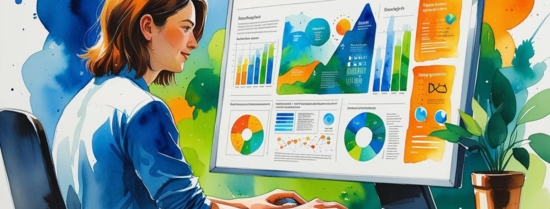Introduction
Key terms: presenting skills, visual communication, graphic design with Canva and PowerPoint, introductory course, relevant for students in any PhD phase.
ECTS: 1.5
Number of sessions: 2
Hours per session: 3 (session 1), 1,5 (session 2)
Do you need to present your research with a poster for an academic conference, but are you not sure how such a poster should look like?
In this course, you will learn how to transform an academic manuscript into an engaging, conference-ready poster. Creating a good poster is more than just summarizing research on a large sheet of paper. Posters use a different way of communicating than academic papers. The graphics and text should work well together to clearly present the main points of the research and engage the audience.
You’ll explore core principles of layout, typography and graphic design, and learn to integrate text and graphics to communicate your research succinctly. Through short lectures, hands-on assignments and mini poster presentations, you will develop practical skills using tools such as Canva and PowerPoint. While the course does not delve into advanced graphic design theory, it offers an accessible, practice-oriented introduction for PhD candidates with little or no design background.
Participants are expected to bring a draft manuscript, a laptop with PowerPoint installed and, for session 2, a draft poster printed in A3 colour.
You can make a poster of your own manuscript. If you do not yet have a fully developed manuscript, you can make a poster of another paper.
Practical information
- Start date
- Expected
- Price
- Free and paid
- Micro Credential
- No
- Teaching mode
- In-person
Who is this for?
This course is designed for PhD candidates with little to no prior experience in graphic design or poster creation. No design background is required.
The course is relevant for PhD students at any stage of their trajectory who wish to enhance their academic communication skills through visual presentation, across all disciplines.
Relations with other courses
While this course focuses on making a poster, the EGSH course Public speaking offers further training in presenting a poster and in presentation more generally. It does not matter in which order you attend the courses; you can either attend this one or the course on public speaking first.
Sessions and preparations
Session 1: Converting writing into graphic design
What will be discussed: Participants will explore common pitfalls and quick wins in poster design, learn how to transform academic writing into visual elements, and gain hands-on experience with tools such as PowerPoint and Canva.
Required preparations: Bring a draft manuscript or paper and a laptop with PowerPoint installed.
Session 2: Presenting your poster in subgroups
Participants will present their poster drafts in small groups, receive peer feedback on design concepts and messaging, and learn best practices for effective poster demonstrations at conferences.
Required preparations: Print your draft poster in A3 colour and bring any revised draft and a laptop.
Start date
Edition 1
Session 1: January 16 (Friday) 2026 | 10.00-13.00 hrs | Offline (Mandeville building, room T19-01)
Session 2: January 30 (Friday) 2026 | 10.00-11.30 hrs | Offline (Mandeville building, room T19-01)
Instructor
 Novika Purnama Sari is Assistant Professor at the University of Groningen (RUG). She obtained her PhD at the Erasmus University Rotterdam (EUR), embedded within the Generation R cohort study at the Erasmus Medical Centre (EMC). From 2020 to 2021, she chaired the EGSH EUR PhD Council and was awarded the EGSH Best Poster Award in 2019 and 2022. Previously, she gained professional experience in a Danish design company as a project manager.
Novika Purnama Sari is Assistant Professor at the University of Groningen (RUG). She obtained her PhD at the Erasmus University Rotterdam (EUR), embedded within the Generation R cohort study at the Erasmus Medical Centre (EMC). From 2020 to 2021, she chaired the EGSH EUR PhD Council and was awarded the EGSH Best Poster Award in 2019 and 2022. Previously, she gained professional experience in a Danish design company as a project manager.
Contact
- Enrolment-related questions: enrolment@egsh.eur.nl
- Course-related questions: n.purnama.sari@rug.nl
Telephone: +31 10 4082607 (Graduate School).
Facts & Figures
- Start date
- Expected
- Price
- free for PhD candidates of the Graduate School
- € 300,- for non-members
consult our enrolment policy for more information
- Tax
- Not applicable
- Micro Credential
- No
- Instruction language
- English
- Teaching mode
- In-person
